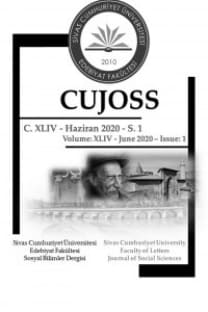On Fichte’s Reconstruction of The Kantian Unity of The I
Fichte’nin Kantçı Ben’in Birliğini Yeniden İnşaası Üstüne
___
- AMERIKS, Karl. (1999), “Fichte’s Appeal Today: The Hidden Primacy of the Practical”, The Emergence of German Idealism: Studies in Philosophy and the History of Philosophy, Vol.:34, edited by Michael Baur and Daniel O. Dahlstrom, The Catholic University of Amerika Press, pp:95-115.
- BREAZEALE, Daniel. (1988), “How to Make an Idealist: Fichte’s “Refutation Of Dogmatism” and the Problem of the Starting Point of the Wissenschaftslehre”, The Philosophical Forum, Vol.:XIX, No:2-3, Winter-Spring, pp. 97-123.
- BREAZEALE, Daniel. (1996), “The Theory of Practice and the Practice of Theory: Fichte and the “Primacy of Practical Reason””, International Philosophical Quarterly Vol.: 36, No:141, pp.47-64.
- FICHTE, J. G. (1970), Fichte: Science Of Knowledge (Wissenschaftslehre) with the First and Second Introductions, edited and translated by Peter Heath and John Lachs, New York: Appleton-Century-Crofts.
- PIPPIN, B. R. (1988), “Fichte’s Contribution,” The Philosophical Forum, Vol.:XIX, No:2-3, Winter-Spring, pp. 74-96.
- SEDWICK, Sally (ed.). (2000), The Reception Of Kant’s Critical Philosophy: Fichte, Schelling and Hegel, Cambridge: Cambridge University Press.
- SNIDER, Eric. (1989), “Scientific Philosophy and Philosophical Method in Fichte”, Metaphilosophy, Vol.: 20, No:1, pp. 68-76.
- TABER, John. (1984), “Fichte’s Emendation of Kant”, Kant Studien, Vol.:75, pp. 442-459.
- WOOD, W. Allen. (2000), “The I as Principle of Practical Philosophy”, The Reception of Kant’s Critical Philosophy: Fichte, Schelling and Hegel, edited by Sally Sedwick Cambridge: Cambridge University Press.
- ISSN: 1305-5143
- Yayın Aralığı: 2
- Yayıncı: Sivas Cumhuriyet Üniversitesi Edebiyat Fakültesi
On Fichte’s Reconstruction of The Kantian Unity of The I
Alman Kültürü ve Edebiyatında Uğursuz Deniz Kızı Olarak Mitleştirilen Kadın
Yaşlılık Olgusu: Sivas Huzurevi Örneği
Toplumsal Yapı Ve Değişme Kuramlarını Paradigma Temelli Bir Sınıflandırma Denemesi
Saint-Exupery’nin Küçük Prens Anlatsında Dostluk Arayışı
Albert Camus’nün ‘Doğrular’ Adlı Oyununda Anlam Ve Değer Bakımından Kişi, Eylem Ve Özgürlük
Son Dönemlerde Yaşanan Krizlerin İşletmeler Üzerindeki Olumlu Etkilerinin Analizi
